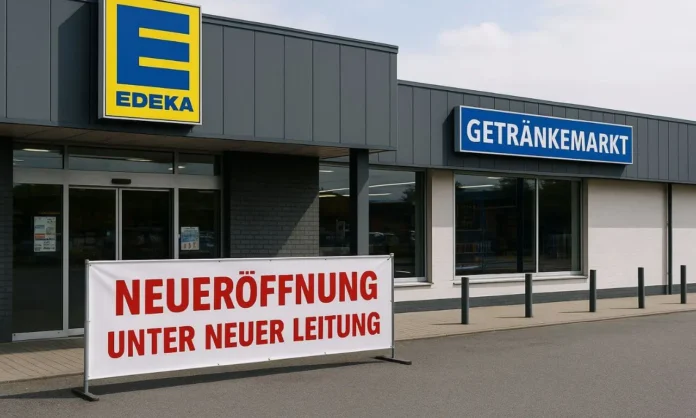Family-run retailer Walter Feinkost KG takes over two Stolberg locations from long-time operator Ender Cevik, signaling deeper succession trends in German supermarket management
In July 2025, a subtle but significant shift will take place on the railway road in Stolberg. After more than a decade of hands-on leadership, EDEKA merchant Ender Cevik will pass on his two stores — a full-service supermarket and adjacent Getränkemarkt — to a new operator: Hendrik Walter, head of the Aachen-based Walter Feinkost KG.
At first glance, the move may seem like a simple generational change. But look closer, and it reflects broader patterns across Germany’s food retail landscape — where family-held stores are quietly transitioning to a new generation of merchants shaped by digital fluency, operational resilience, and a fresh take on community-led retailing.
“Coming Home” — But with a Business Edge
Walter isn’t a stranger to Stolberg. In fact, his career with EDEKA began just down the road in Büsbach in 2010. Now, 15 years later, returning as the new owner of two revitalized stores is both a personal milestone and a commercial opportunity.
“It feels like coming home,” Walter said in a statement. “We thank Mr. Cevik for his trust — and we’re ready to build on the strong foundation he created.”
Walter’s current store — the E center Trierer Straße in Aachen — is a modern, regionally respected location with a reputation for fresh food, strong staff culture, and product depth. Adding the Stolberg sites to his portfolio is a clear sign of his ambition to scale responsibly across western Germany, starting with familiar ground.
Ender Cevik: A Quiet Architect of Local Retail
Cevik’s departure marks the end of an era. A veteran of the EDEKA network since 1982, he developed the Stolberg locations from the ground up in 2014. For nearly 11 years, he ran them with a hands-on approach — focused on customer loyalty, product consistency, and team retention.
Even after the devastating 2021 floods, which closed the stores for 18 months, Cevik led their full recovery, reopening in 2023 with a redesigned layout and refurbished interiors.
“It was a long road back,” he said. “But we made it together — with our team, and with our customers.”
His decision to step down is age-related, but also strategic. Cevik will continue overseeing his e-center in Aachen, while trusting the Walter family to uphold his values in Stolberg.
Ownership Transitions: The Silent Backbone of German Grocery Retail
While media headlines often focus on mergers, tech partnerships, or category innovations, succession planning is quietly redefining Germany’s independent supermarket sector.
Across the country — particularly in Nordrhein-Westfalen, Rheinland-Pfalz, and Baden-Württemberg — senior merchants are preparing for retirement. Many are handing their stores to younger operators with family support, fresh capital, and a renewed focus on operational flexibility, local hiring, and experience-driven retailing.
These handovers rarely make national headlines, but they’re reshaping the structure of local commerce:
Staff are retained, not replaced
Opening hours and store identity stay consistent
Community trust is preserved
Infrastructure investments are more likely to continue under a regional operator than a national player
In this case, the EDEKA Stolberg store ownership change is part of that wider pattern — but with added historical and emotional weight, given the 2021 disaster recovery and Cevik’s decades-long career.
What Changes, What Doesn’t
For customers, little will change at first glance. The Monday to Saturday, 7 a.m.–9 p.m. hours will remain. So will the staff, most of whom have worked through both the store’s peak periods and its post-flood closure.
But insiders say Walter plans to bring operational enhancements over time — not in branding, but in logistics, regional product curation, and digital integrations (particularly mobile-friendly loyalty offers and click-and-collect functionality).
This follows a trend seen in other Walter-operated sites, where hot counters, organic produce, and regional dairy partnerships are positioned front and centre.
Post-Flood Retail: A Test of Resilience
The reopening of the Railway Road stores in 2023 was a milestone in Stolberg’s flood recovery. EDEKA, like many German chains, faced infrastructure loss, supply chain disruption, and community displacement after the July 2021 floods.
Rebuilding took nearly two years, during which Cevik personally coordinated renovations, staff management, and customer communications. That experience shaped the culture of the stores — rooted in resilience, local loyalty, and practical service.
Walter’s takeover means that this culture won’t be lost — it will be inherited.
Strategic Implications: Micro-Scale Growth with Macro-Level Stability
This transition fits a quiet but powerful model of retail evolution: micro-scale expansion with family-led continuity.
Unlike big-box entrants or investment-backed consolidations, these regional transfers retain identity while enabling scale. Walter Feinkost KG now operates three locations in western Germany — large enough to benefit from centralized procurement and pricing leverage, yet small enough to keep decision-making local.
This model is especially relevant in Germany’s competitive grocery environment, where private label penetration is high, customer loyalty is hard-won, and regional authenticity is a true differentiator.
Technical Summary
New operator: Walter Feinkost KG (Aachen)
Outgoing merchant: Ender Cevik (since 2014)
Locations: EDEKA supermarket + drinks market, Railway Road, Stolberg
Employee transition: All retained
Inventory closure: 30 June 2025
Ownership effective: 1 July 2025
Hours: Mon–Sat, 7 a.m.–9 p.m.



